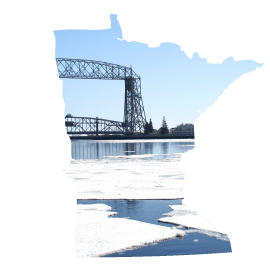Secondary Teacher Preparation in Social
Studies: Minnesota
Delivering Well Prepared Teachers Policy
Analysis of Minnesota's policies
Minnesota only offers a general social studies certification to secondary teachers. Candidates are required to pass the MTLE "Social Studies" test, which is comprised of two subtests. Subtest One combines social studies skills, world history, and U.S. and Minnesota history. Subtest Two combines geography, government and citizenship, economics and behavioral sciences. Candidates must pass each subtest to pass the test. Teachers with this license are not limited to teaching general social studies but rather can teach any of the topical areas.
Middle school social studies teachers must earn a specific middle level endorsement, which requires a minor in social studies and an initial license in either elementary or secondary teaching. Commendably, candidates must also pass the MTLE Middle Level "Social Studies" test. Unfortunately, a teacher holding an elementary K-6 license may teach grades 7 and 8 in self-contained classrooms (see Goal 1-E).
Recommendations for Minnesota
Require secondary social studies teachers to pass tests of content knowledge for each social studies discipline they intend to teach.
Although Minnesota's new test is on the right track with its requirement of a passing score on each subtest, the state still combines subject areas within those subtests without reporting individual scores. Therefore, Minnesota falls short by not ensuring that secondary social studies teachers have the requisite content knowledge in all subject areas.
State response to our analysis
Minnesota recognized the factual accuracy of this analysis. The state added that although the reference to self-contained classrooms taught by teachers with a K-6 license is accurate, it should be noted that these settings are rare and represent unique student populations such as those in a one-room schoolhouse. "The vast majority of teachers teach in a middle school, junior high school, or combined middle and high school, and are held to the requirement of a content-specific endorsement."
Select another topic
Delivering Well Prepared Teachers
- Admission into Preparation Programs
- Elementary Teacher Preparation
- Elementary Teacher Preparation in Reading Instruction
- Elementary Teacher Preparation in Mathematics
- Middle School Teacher Preparation
- Secondary Teacher Preparation
- Secondary Teacher Preparation in Science
- Secondary Teacher Preparation in Social Studies
- Special Education Teacher Preparation
- Assessing Professional Knowledge
- Student Teaching
- Teacher Preparation Program Accountability
Expanding the Pool of Teachers
Identifying Effective Teachers
- State Data Systems
- Evaluation of Effectiveness
- Frequency of Evaluations
- Tenure
- Licensure Advancement
- Equitable Distribution

